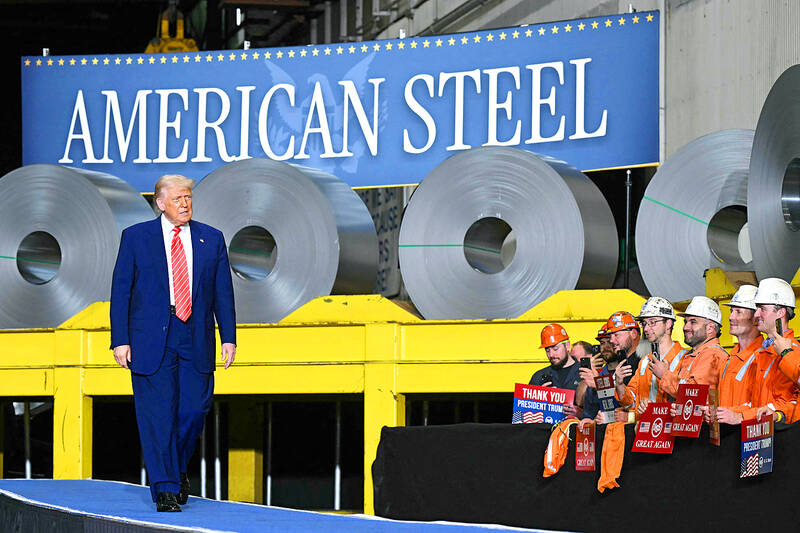US President Donald Trump has raised steel and aluminum tariffs to 50 percent from 25 percent, following through on a pledge to boost US import taxes to help domestic manufacturers.
Trump cast the move, which took effect yesterday, as necessary to protect national security.
An order signed on Tuesday said the previous charge had “not yet enabled” domestic industries “to develop and maintain the rates of capacity production utilization that are necessary for the industries’ sustained health and for projected national defense needs.”

Photo: AFP
“Increasing the previously imposed tariffs will provide greater support to these industries and reduce or eliminate the national security threat posed by imports of steel and aluminum articles and their derivative articles,” according to the directive, which the White House posted on social media.
Metal charges on imports from the UK would remain at the previous 25 percent rate to allow the two to work on new levies or quotas by a July 9 deadline, the order said.
Trump’s latest levy is fanning trade tensions at a time when the US is locked in negotiations with numerous trading partners over his so-called “reciprocal” duties. The Trump administration had asked nations to submit their best offers on trade talks by yesterday.
The Office of the US Trade Representative (USTR) has sent letters to trading partners to remind them of an upcoming deadline in tariff negotiations, the White House said.
“I can confirm the merits in the content of the letter,” White House press secretary Karoline Leavitt told reporters on Tuesday.
“USTR sent this letter to all of our trading partners, just to give them a friendly reminder that the deadline is coming up, and they are in talks,” she said. “The president expects good deals, and we are on track for that.”
In Taipei, the government on Tuesday said that it was continuing to “communicate closely” with the US government on tariff talks, but could not give more information at this point due to a tacit agreement between the two sides.
“If there is any progress, it will be made known to the public in due course,” the Executive Yuan said in comments sent to Reuters, without giving details.
Trump is also tipped by the White House to have a telephone call later this week with Chinese President Xi Jinping (習近平), after the two sides accused each other of breaching the terms of an agreement last month to roll back some tariffs.
However, Trump said in a late-night social media post that Xi was very tough to make a deal with, raising questions about whether a fragile economic truce between the world’s two largest economies would hold.
A key sticking point for direct leader-level talks appears to be critical minerals. US officials have accused Beijing of continuing to choke off access to rare earths, despite Washington’s decision to reduce tariffs last month hinging on China lifting such controls.
Additional reporting by Reuters

Taiwan Semiconductor Manufacturing Co (TSMC, 台積電) secured a record 70.2 percent share of the global foundry business in the second quarter, up from 67.6 percent the previous quarter, and continued widening its lead over second-placed Samsung Electronics Co, TrendForce Corp (集邦科技) said on Monday. TSMC posted US$30.24 billion in sales in the April-to-June period, up 18.5 percent from the previous quarter, driven by major smartphone customers entering their ramp-up cycle and robust demand for artificial intelligence chips, laptops and PCs, which boosted wafer shipments and average selling prices, TrendForce said in a report. Samsung’s sales also grew in the second quarter, up

On Tuesday, US President Donald Trump weighed in on a pressing national issue: The rebranding of a restaurant chain. Last week, Cracker Barrel, a Tennessee company whose nationwide locations lean heavily on a cozy, old-timey aesthetic — “rocking chairs on the porch, a warm fire in the hearth, peg games on the table” — announced it was updating its logo. Uncle Herschel, the man who once appeared next to the letters with a barrel, was gone. It sparked ire on the right, with Donald Trump Jr leading a charge against the rebranding: “WTF is wrong with Cracker Barrel?!” Later, Trump Sr weighed

HEADWINDS: Upfront investment is unavoidable in the merger, but cost savings would materialize over time, TS Financial Holding Co president Welch Lin said TS Financial Holding Co (台新新光金控) said it would take about two years before the benefits of its merger with Shin Kong Financial Holding Co (新光金控) become evident, as the group prioritizes the consolidation of its major subsidiaries. “The group’s priority is to complete the consolidation of different subsidiaries,” Welch Lin (林維俊), president of the nation’s fourth-largest financial conglomerate by assets, told reporters during its first earnings briefing since the merger took effect on July 24. The asset management units are scheduled to merge in November, followed by life insurance in January next year and securities operations in April, Lin said. Banking integration,

LOOPHOLES: The move is to end a break that was aiding foreign producers without any similar benefit for US manufacturers, the US Department of Commerce said US President Donald Trump’s administration would make it harder for Samsung Electronics Co and SK Hynix Inc to ship critical equipment to their chipmaking operations in China, dealing a potential blow to the companies’ production in the world’s largest semiconductor market. The US Department of Commerce in a notice published on Friday said that it was revoking waivers for Samsung and SK Hynix to use US technologies in their Chinese operations. The companies had been operating in China under regulations that allow them to import chipmaking equipment without applying for a new license each time. The move would revise what is known